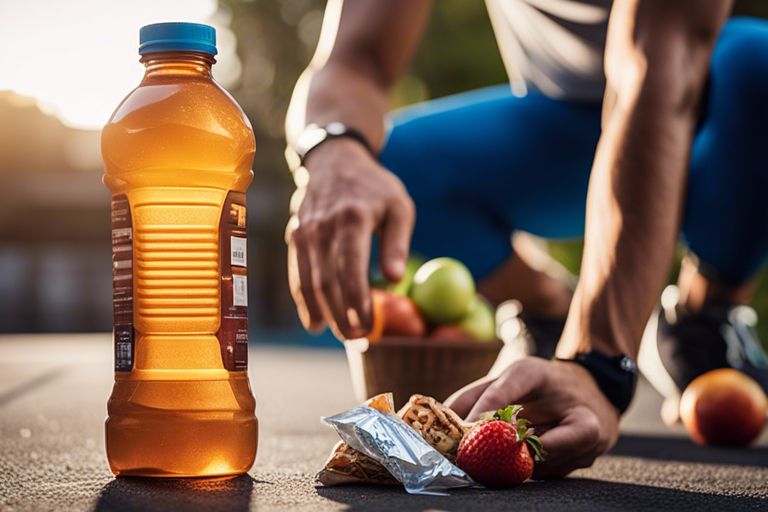When considering fuelling your body for a run, making the right nutritional choices can make a significant difference in your performance and overall well-being. However, there are certain foods and beverages that should be avoided before hitting the pavement. In this guide, we will explore what to steer clear of to ensure a smooth and successful jogging session.
Key Takeaways:
- Avoid high-fibre foods: Consuming high-fibre foods before a run can lead to gastrointestinal distress.
- Avoid sugary foods: Foods high in sugar can cause energy crashes during a run.
- Avoid spicy foods: Spicy foods can cause heartburn or indigestion while jogging.
- Avoid fatty foods: Foods high in fat can be hard to digest and can lead to discomfort during a run.
- Avoid new foods: Stick to familiar foods before a run to avoid any surprises or negative reactions while exercising.
Understanding Nutritional Needs for Joggers
Macronutrient Balance for Endurance
Concerning maintaining energy levels during long runs, joggers need to focus on achieving the right balance of macronutrients in their diet. Carbohydrates are a primary source of energy and should make up a significant portion of a runner’s diet. Proteins play a role in muscle repair and recovery, while fats provide a secondary source of fuel. Finding the right balance of carbs, proteins, and fats is necessary for sustaining endurance and maximising performance.
Hydration Strategies Before, During, and After Runs
Proper hydration is crucial for optimising performance and avoiding fatigue during runs. It is important for joggers to hydrate well before, during, and after their runs. Before a run, it’s recommended to drink around 500ml of water 2 hours before starting. During the run, sipping small amounts of water regularly can help maintain hydration levels. After the run, replenishing fluids lost through sweat is key to promoting recovery and preventing dehydration-related issues.
Foods to Avoid Before a Run
Heavy and Fatty Foods
Avoid consuming heavy and fatty foods before a run as they can lead to stomach discomfort and sluggishness. Foods high in fat take longer to digest, which can hinder your performance and increase the risk of cramps. Opt for lighter, easily digestible meals to fuel your run.
Sugary Snacks and Drinks
Avoid sugary snacks and drinks before a run as they can cause a sudden spike in blood sugar levels followed by a crash, leaving you feeling low on energy. Instead, focus on complex carbohydrates that provide a steady release of energy to sustain you throughout your run.
Sugary snacks and drinks may provide a quick energy boost, but they are not ideal for fuelling a run. The temporary energy surge is often not worth the subsequent crash, which can leave you feeling fatigued mid-run. It’s best to opt for balanced meals and snacks that provide a mix of carbohydrates, proteins, and fats to keep your energy levels stable.
Dietary Mistakes During a Run
Overconsumption of Energy Gels and Sports Drinks
One common mistake that runners often make during a run is overconsuming energy gels and sports drinks. While these products can provide a quick energy boost, overconsumption can lead to stomach discomfort and even nausea. It is important to follow the recommended guidelines for consumption and not exceed the suggested intake to avoid any adverse effects.
Ignoring Hunger and Hydration Cues
Another mistake to avoid during a run is ignoring hunger and hydration cues. It is crucial to listen to your body and fuel it appropriately with snacks and water when needed. Ignoring these cues can lead to a drop in performance, fatigue, and even dehydration. Remember to pack some easily digestible snacks like bananas or energy bars to refuel during your run, and stay hydrated by sipping water regularly.
Post-Run Nutrition Pitfalls
Excessive Calorie Consumption
One pitfall to avoid after a run is excessive calorie consumption. It’s easy to overestimate how many calories you’ve burned during your run and then compensate by consuming a large amount of food. This can sabotage your efforts to stay in a caloric deficit if weight loss is your goal. Stick to a balanced post-run meal or snack that provides your body with the nutrients it needs without overdoing it on the calories.
Neglecting Protein and Carbohydrate Recovery
Another common mistake is neglecting the importance of protein and carbohydrate recovery after a run. Protein helps repair and rebuild your muscles, while carbohydrates replenish your energy stores. Failing to consume these nutrients after a run can lead to muscle fatigue, slower recovery, and decreased performance in future runs. Be sure to include sources of both protein and carbohydrates in your post-run meals or snacks to support optimal recovery.
Jogging and Nutrition – What to Avoid During a Run
In terms of jogging, maintaining the right nutrition is imperative. Avoid high-fat and high-fibre foods before running to prevent digestive issues. Steer clear of foods high in sugar or caffeine that can cause energy crashes during your run. Opt for easily digestible carbohydrates and a moderate amount of protein for sustained energy. Hydration is also key, so avoid alcohol and drink plenty of water before and after your workout. By paying attention to what you eat and drink before jogging, you can maximise your performance and avoid discomfort while on the run.
Hence, being mindful of your nutrition choices before jogging can significantly impact your performance and overall experience. By avoiding certain foods and opting for those that provide sustained energy and hydration, you can make the most of your workout and achieve your fitness goals effectively. Be mindful of, what you consume before a run can make a real difference in how you feel and perform, so choose wisely to fuel your body for success.
FAQ
Q: What are some important nutrition tips to follow before going for a run?
A: It is important to fuel up with a light, easily digestible meal 1-2 hours before a run. Avoid foods high in fat, fibre, or spice to prevent stomach discomfort during your run.
Q: Is it advisable to consume caffeine before a run?
A: While caffeine can provide an energy boost, it is advisable to consume it in moderation before a run. Excessive caffeine can lead to dehydration and increased heart rate.
Q: What should be avoided during a run in terms of nutrition?
A: Avoid heavy, greasy foods as they can cause cramps and discomfort during your run. Also, stay away from high-fibre foods that may lead to gastrointestinal issues.
Q: Is it recommended to eat immediately after a run?
A: Yes, it is important to replenish your energy stores after a run. Aim for a balanced post-run meal or snack containing carbohydrates and protein to aid in muscle recovery.
Q: How can hydration impact your running performance?
A: Staying properly hydrated is crucial for optimal running performance. Dehydration can lead to fatigue, muscle cramps, and decreased endurance. Be sure to drink water before, during, and after your run.






